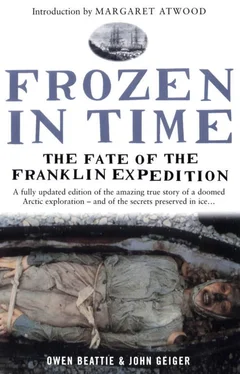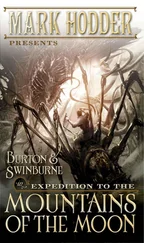A pervasive melancholy set in, and scurvy made its first appearance in September. By Christmas, there was a general shortness of breath, and the officers noticed a strange phenomenon that the British searchers had also identified, “a sort of craving” for animal fats. Kane described the complexions of the crewmen as having assumed a “peculiar waxy paleness,” even “ghostliness.” The men reported outlandish, vivid dreams. One described finding “Sir John Franklin in a beautiful cove, lined by orange-trees.” Another dreamt he had visited the desolate nearby coast and “returned laden with watermelons.” By January, de Haven was also stricken and forced to relinquish command. Among other complaints, he suffered severe pain from a wound in his hand inflicted by a schoolmaster’s ruler twenty-five years before. In February, twelve men were laid out by stiff and painful limbs. Largely dependent on salted and preserved foods, the crew’s stores of antiscorbutics, raw potatoes and lime juice were running low. In May, the crew succeeded in killing a large number of seals and walrus, and catastrophe was averted.
The second Grinnell expedition, this time commanded by Elisha Kent Kane, sailed in 1853 with instructions to search Smith Sound, ostensibly for Franklin’s missing ships. The expedition was, in fact, a thinly veiled run at the North Pole. This was his first command, and Kane was hardly the image of a grizzled Arctic explorer. Of sickly, almost dainty, constitution, he made up for his physical limitations with the spirit of a dauntless adventurer—his account of this journey is infused with romanticism. He relished the Arctic as a “mysterious region of terrors” as he tacked north through Smith Sound into an unexplored basin that now carries his name. Here, the crew established a winter harbour off the coast of Greenland and lived in a state of perpetual misery. Kane was right with respect to one thing: the terrors abounded. The ship was not insulated, and Kane had miscalculated on the amount of fuel required. By February they could no longer spare fuel to melt water to wash in. It was so cold inside the Advance that one man’s tongue froze to his beard.
Dependent on “ordinary marine stores,” notably pemmican and salt pork, there was also a severe outbreak of scurvy among the twenty men. Kane carefully noted the advance of symptoms. In February 1854, he wrote, “scurvy and general debility have made me short o’ wind.” In April, Kane dispatched his sledging parties north towards the pole. It was a foolhardy gambit that soon degenerated, the party stricken with frostbite and scurvy. The illness that had gnawed at them all winter now threatened to consume them entirely. Kane himself had to be carried back to the Advance, “nearly insensible and so swollen with scurvy as to be hardly recognizable.” His condition was regarded as hopeless. When the party reached the ship they were in total disarray, suicidal, incoherent, disease-ridden, gesticulating wildly and conversing with themselves. The ship “presented all the appearances of a mad house.” There remained only three men well enough to carry out ordinary duties. To top it all, rats had infested the ship.
Fortunately, with summer’s thaw, the hardships that had characterized the winter abated. Hunting parties were sent off and, with a large supply of fresh meat, health was soon restored. But the ice failed to clear from the ship’s harbour, and the crew faced a second winter.
Under stress Kane proved to be unfit for command. He became irritable and quarrelsome, and when he wasn’t picking an argument with one of his officers he was boasting about his family’s status or his amorous conquests back in Philadelphia. His lengthy dinnertime monologues were liberally peppered with Latin phrases, all for the benefit of men he considered his social inferiors. Sick and starved to the bone (on a good day eating the entrails of a fox, on a bad day sucking on their mittens), the crew looked on with a mixture of incredulity and contempt as their commander tried to impress them by speaking the ancient language. Soon, secret meetings were organized, and in September, seven of the men announced to Kane their intention to desert ship and attempt a 700-mile (1,126-km) trek south to Upernavik, the northernmost of Greenland’s Danish communities. Yet the mutineers got nowhere near it before returning to the brig nearly frozen to throw themselves at Kane’s mercy, which proved a shallow well indeed.
As the second winter set upon them they were nearly out of coal, and Kane ordered the men to use wood from the Advance for fuel. They tore off the deck sheathing and removed the ship’s rails and upper spars. Unable to secure adequate supplies of raw meat in the fall, the disease returned even more virulently. The symptoms were gruesome. One man had the flesh drop from his ankle, exposing bone and tendons. By December, the only antiscorbutics left were the scrapings of raw potatoes, but there were only twelve of the potatoes left and they were three years old. The entire crew was seriously ill, and Kane was surprised to discover their condition improved or worsened in exact relation to their infrequent ability to obtain fresh meat. Wrote Kane: “Our own sickness I attribute to our civilized diet; had we plenty of frozen walrus I would laugh at scurvy.” He later wrote admiringly of the Inuit: “Our journeys have taught us the wisdom of the Esquimaux appetite, and there are few among us who do not relish a slice of raw blubber or a chunk of frozen walrus-beef… as a powerful and condensed heat-making and antiscorbutic food it has no rival.”
Other searchers had come to the same realization, and one, the surgeon Peter Sutherland, suggested in 1852 that had Franklin needed to increase his stock of provisions, “there is no doubt his ingenuity would suggest to him what the Eskimos have practiced for thousands of years—preserving masses of animal substances, such as whales flesh, by means of ice, during the summer months, when it may be easily obtained, for their use during winter.”
The realization came too late for Kane. The health of the crew reached its worst in the spring of 1855, and several men died. At one point, Kane referred to his compatriots in his journal as “my crew,” then corrected himself, writing: “I have no crew any longer.” Instead, he began referring to the men as “the tenants of my bunks.” Kane was, at this point, effectively alone. Of the men on the expedition, only he had remained in comparatively good health throughout the second winter. The reason was simple: Kane had taken to eating the rats infesting the ship. Despite their privations, he could not convince any of the other men to join him.
In the spring, after acquiring fresh walrus meat with the help of some of the natives of Greenland who visited the ship, the bedraggled partly abandoned the Advance and made its way down the coast, first over the ice and then in small boats. After eighty-four days they flagged down a Danish shallop and were saved. They had done nothing to advance the search for Franklin. In fact, they were some 1,000 miles (1,609 km) away from where the last remnants of the expedition were finally located.
By 1854 nine years had elapsed since Franklin set sail on his voyage of discovery. He had provisions for three years, though it was thought the supplies could have been rationed to last some months longer, perhaps until 1849. What became obvious to the Admiralty was that, regardless of what more could be done to solve the mystery, nothing could be done to save Franklin and his men. On 20 January 1854, a notice in the London Gazette stated that unless news to the contrary arrived by 31 March, the officers and crews of the Erebus and Terror would be considered to have died in Her Majesty’s service, and their wages would be paid to relatives up to that date. The expedition’s muster books show the sailors buried on Beechey Island, however, were “discharged dead” according to the dates on their headboards: William Braine on 3 April 1846, John Hartnell on 4 January 1846, John Torrington on 1 January 1846.
Читать дальше










